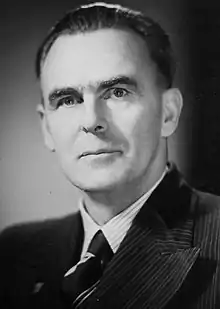Wilfred Fortune
Wilfred Henry Fortune (9 October 1897 – 28 February 1961) was a New Zealand politician of the National Party.
Wilfred Fortune | |
|---|---|
 | |
| Member of the New Zealand Parliament for Eden | |
| In office 27 November 1946 – 13 November 1954 | |
| Preceded by | Bill Anderton |
| Succeeded by | Duncan Rae |
| Personal details | |
| Born | 9 October 1897 Paeroa, New Zealand |
| Died | 28 February 1961 Auckland, New Zealand |
| Political party | National |
| Alma mater | University of Auckland |
| Military service | |
| Allegiance | New Zealand Army |
| Rank | |
| Battles/wars | World War II |
Personal life
Fortune was born in 1897 in Paeroa. He received his education at Auckland Grammar School, the Auckland Teachers' Training College, and the University of Auckland. He obtained a B.A., a B.Com., and a diploma in social sciences. He initially worked as a teacher, then became a public secretary, and was then managing director of Young and Fortune Ltd. During World War II, he was a lieutenant colonel with the New Zealand Expeditionary Force (NZEF) in the Pacific.[1] Fortune died on 28 February 1961.[1]
Political career
| Years | Term | Electorate | Party | ||
|---|---|---|---|---|---|
| 1946–1949 | 28th | Eden | National | ||
| 1949–1951 | 29th | Eden | National | ||
| 1951–1954 | 30th | Eden | National | ||
As an Independent, he contested the 1940 by-election in the Auckland West electorate resulting from Michael Joseph Savage's death, but was beaten by Labour's Peter Carr.[1][2] He stood for National in the 1943 election, but was beaten by the incumbent, Labour's Bill Anderton, by only 14 votes. In 1941 he won a seat on the Auckland City Council, serving two terms.[3][4]
Member of parliament
Fortune was first elected to parliament at the subsequent election in 1946, when Anderton successfully stood in Auckland Central,[5] and Fortune was returned in Eden. Fortune held Eden until the 1954 election, when he was defeated for Onslow.[6] He was a member of the Executive Council from 1949 to 1954 in the First National Government.[7] In January 1950 he was appointed Minister of Police.[8]
In 1955, Fortune was granted the use of the title of "Honourable" for life, having served more than three years as a member of the Executive Council.[9]
After parliament
From 1956 until his death, he chaired the National Party in Auckland. In 1957 he won a by-election to regain a seat on the Auckland City Council.[10] His interests lay in education and health, and he was a member of the Auckland Education Board, and the Seddon Memorial Technical College Board of Governors. He was a director of the YMCA, and chaired the Auckland Central Health Camp Council.[1]
Notes
- Gustafson 1986, p. 311.
- Wilson 1985, p. 188.
- "Electoral". The New Zealand Herald. Vol. LXXVIII, no. 23973. 24 May 1941. p. 3. Retrieved 20 November 2017.
- "Local Body Elections". Vol. LXXV, no. 136. Auckland Star. 10 June 1944. p. 9. Retrieved 10 May 2017.
- Wilson 1985, p. 180.
- Wilson 1985, p. 197.
- Wilson 1985, p. 86.
- "Personal". No. 27292. Otago Daily Times. 19 January 1950. p. 6. Retrieved 10 May 2020.
- "No. 40421". The London Gazette. 1 March 1955. p. 1269.
- "Final Figures Little Changed". The New Zealand Herald. 18 December 1957. p. 14.
References
- Gustafson, Barry (1986). The First 50 Years : A History of the New Zealand National Party. Auckland: Reed Methuen. ISBN 0-474-00177-6.
- Wilson, James Oakley (1985) [First ed. published 1913]. New Zealand Parliamentary Record, 1840–1984 (4th ed.). Wellington: V.R. Ward, Govt. Printer. OCLC 154283103.